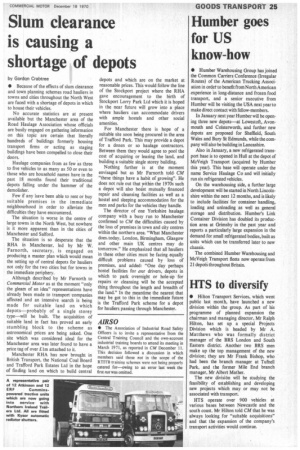Slum clearance is causing a shortage of depots
Page 27

If you've noticed an error in this article please click here to report it so we can fix it.
by Gordon Crabtree • Because of the effects of slum clearance and town planning schemes road hauliers in towns and cities throughout the North West are faced with a shortage of depots in which to house their vehicles.
No accurate statistics are at present available but the Manchester area of the Road Haulage Association whose officials are busily engaged on gathering information on this topic are certain that literally hundreds of buildings formerly housing transport firms or acting as staging buildings have been compelled to close their doors.
Haulage companies from as few as three to five vehicles to as many as 50 or even to those who are household names have in the past 18 months found their traditional depots falling under the hammer of the demolisher.
Few if any have been able to rent or buy suitable premises in the immediate neighbourhood in order to alleviate the difficulties they have encountered.
The situation is worse in the centre of large towns in the North West, but nowhere is it more apparent than in the cities of Manchester and Salford.
The situation is so desperate that the RHA in Manchester, led by Mr W. Farnorth, secretary, is engaged on producing a master plan which would mean the setting up of central depots for hauliers not only for the two cities but for towns in the immediate periphery.
Although described by Mr Farnorth to Commercial Motor as at the moment "only the gleam of an idea" representations have already been made to transport companies affected and an intensive search is being made for suitable land on which depots—probably of a single storey type—will be built. The acquisition of suitable land in fact has proved an early stumbling block to the scheme as astronomical prices are being asked. One site which was considered ideal for the Manchester area was later found to have a price tag of over £1m attached to it.
Manchester RHA has now brought in British Transport, the National Coal Board and Trafford Park Estates Ltd in the hope of finding land on which to build central depots and which are on the market at reasonable prices. This would follow the line of the Stockport project where the RHA gave encouragement to the birth of Stockport Lorry Park Ltd which it is hoped in the near future will grow into a place where hauliers can accommodate drivers with ample hostels and other social amenities.
For Manchester there is hope of a suitable site soon being procured in the area of Trafford Park. This may provide a depot for a dozen or so haulage contractors. Between them they would agree to pool the cost of acquiring or leasing the land, and building a suitable single storey building.
Nothing further is at the moment envisaged but as Mr Farnorth told. CM "these things have a habit of growing". He does not rule out that yvithin the 1970s such a depot will also boast mutually financed repair and cleansing facilities as well as a hostel and sleeping accommodation for the men and parks for the vehicles they handle.
The director of one Yorkshire haulage company with a busy run to Manchester confirmed to CM the difficulties caused by the loss of premises in town and city centres within the northern area. "What Manchester does.today, London, Birmingham, Glasgow and other main UK centres may do tomorrow." He emphasized that all hauliers in these other cities must be facing equally difficult problems caused by loss of premises, and added: "One day perhaps hostel facilities for our drivers, depots in which to park overnight or hole-Up for repairs or cleansing will be the accepted thing throughout the length and breadth of the land." In the meantime the nearest that may be got to this in the immediate future is the Trafford Park scheme for a depot for hauliers passing through Manchester.






















































































































